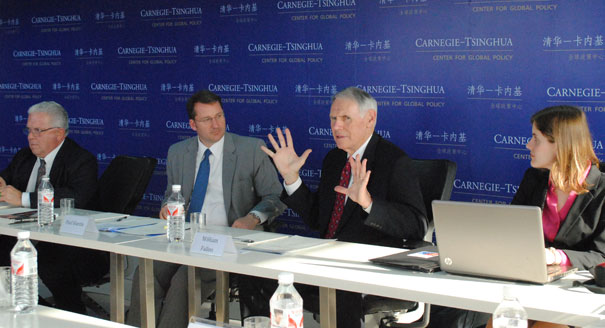Registration
You will receive an email confirming your registration.
Since his February 2012 visit to the United States, Chinese President Xi Jinping has been calling for a new type of great-power relationship with the United States to pave the way for China’s smooth ascendance into the changing global order. Policymakers in China and the West are assessing how the traditional frameworks for engaging with China fit with Xi’s concept of the new great-power relationship.
Carnegie-Tsinghua’s Paul Haenle hosted a roundtable discussion featuring Charles Freeman, former U.S. Ambassador to Saudi Arabia and co-chair of the U.S. China Policy Foundation; U.S. Four Star Navy Admiral William Fallon, former head of U.S. Central Command and the U.S. Pacific Command; Zhu Feng, a professor at Peking University; Huang Ping, a scholar at the Chinese Academy for Social Sciences; Carnegie’s Li Bin; and Carnegie-Tsinghua’s Sun Xuefeng.
Traditional Frameworks Have Diminishing Utility
One U.S. scholar explained how the existing frameworks for Sino-U.S. relations must adjust to the economic and security realities of the new global order.
- Traditional Frameworks: One U.S. scholar detailed the four frameworks which have been used by the United States to engage China. The first was former U.S. president Franklin D. Roosevelt’s post-World War II framework, in which China was one of the world’s “Four Policemen,” along with the United States, United Kingdom, and the Soviet Union. This cooperative narrative turned into a policy of containing China as it transitioned into communism during the Cold War. The resulting isolation of China led to the third framework during the Nixon administration, when former U.S. president Richard Nixon sought to align with China against the Soviets. The final and present framework arose in 1989 after the collapse of the Soviet Union and features attempts to integrate China into the current global order.
- Rising versus Status Quo Power: A number of discussants called for a new framework to avoid the traditional relationship and expected confrontation between a rising power and a great power. One Chinese participant added that this is particularly important because the United States can no longer dictate the rules of global governance as China’s economic preeminence will continue to grow in the next half-century.
- Chinese Perspective: One Chinese scholar indicated the need for a new framework that will account for China’s rapid development and global power. However, he noted that it must make room for the nuances of China’s position as a developing country with unrealized market potential and the need for continued peace as it pursues the “China Dream.” He also clarified that the new “great-power relationship” is not a concept limited to Sino-U.S. engagement.
Elements of a New Framework
Panelists discussed the barriers to stronger engagement and the necessary policy changes.
- Changing Global Realities: Several scholars agreed that any revised or new framework must account for China’s economic might and increasing global influence. One U.S. scholar predicted that any effort to exclude China from economic arrangements is doomed to failure. Therefore, he added that the Trans-Pacific Partnership must eventually include China. He also stated that the bilateral military relationship must be improved. At a multilateral level, the political framework must account for devolution of power away from centralized actors.
- Stability Mechanism: Panelists agreed that interruptions in military engagements have contributed to derailing negotiations and cooperation between China and the United States. One scholar noted there have been six interruptions in military engagements such as when Beijing broke off military-to-military relations after the United States approved a $6 billion arms sale to Taiwan in 2010. In each of these cases, short-term concerns had jeopardized long-term interests. The scholar added that any new framework must be insulated from such shocks as the “stakes are too high.”
- Barriers to Engagement: One Chinese scholar explained that from the Chinese perspective, U.S. arms sales to Taiwan and mutual suspicion over reconnaissance missions are major barriers to sustained engagement. Another U.S. participant explained that China and the United States must agree to set aside core tensions between the two countries and focus on global challenges where Beijing and Washington share mutual interests.
On Korean Peninsula Affairs
The panel debated the future of the Korean Peninsula, focusing on unresolved questions of how to approach Pyongyang.
- On Military Forces and Responses: A U.S. scholar highlighted the strength of South Korean ground forces, stating that they are “highly capable” and that Northern invasion could swiftly be repelled. One Chinese scholar inquired about Washington’s expected response if China chose to use of force in East Asia. No definitive answer was supplied, though it was noted that the U.S. rebalance to Asia was intended to maintain and promote peace, not destabilize the region.
- On A Hypothetical War and the Ensuing Rebalancing: One recurring question throughout debate was the differing projections of the future of the Korean Peninsula and North Korea. While many Chinese are concerned that the U.S. objective for North Korea is forcible regime change, a U.S. scholar cautioned that neither Seoul nor Pyongyang wants to start a war. However, considering the fragility of the North Korean domestic situation, U.S. discussants agreed that contingency planning would be helpful to prepare and discuss strategic questions such as what happens to North Korea’s nuclear arsenal, who will absorb North Korean refugees, and what geo-political resolutions can be reached that could be acceptable to all Koreans and regional powers.
Discussants included: Jia Qingguo, Chi Wang, Zhu Feng, Huang Ping
